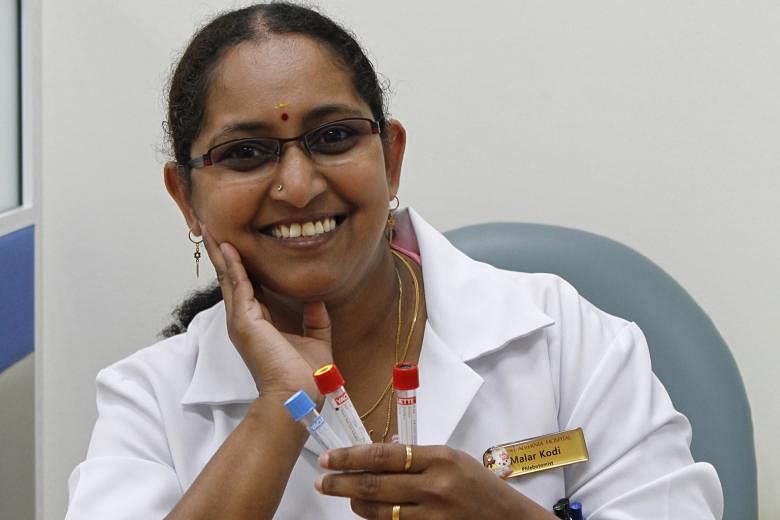Q. I specialise in collecting blood from patients because...
A. It combines my interest in medical science and my desire to connect with patients.
This is also a job that requires fine motor skills to successfully insert a needle into a vein. With every success in drawing blood, it helps put my patients at ease.
I also have to be very well organised and be attentive to details, so as to be able to do accurate sample identification and labelling.
Q. Blood is fascinating because...
-
BIOBOX
-
MS MALAR KODI RAMAN
Age: 40
Occupation: Phlebotomist at Mount Alvernia Hospital Ms Malar's career in healthcare started when she was 18.
Then, the nursing aide at a private hospital in Selangor, Malaysia, learnt to do basic bedside nursing, such as temperature taking and sponging patients, while on the job.
She also picked up knowledge about the different types of tests conducted in medical laboratories through an aunt who worked in the field.
After she married in 1997, she worked as a laboratory technician in several hospitals.
She then took the advice of a supervisor to further her studies in phlebotomy at Singapore Polytechnic for three months.
She took up a job here in 2007 as a phlebotomist at Mount Alvernia Hospital, where she is now one of six such allied health professionals who draw blood from patients.
She is married to a 42-year-old storekeeper. They have a 17-year-old son and a 13-year-old daughter.
A. It tells you everything about a person's health.
Taking a person's blood helps to diagnose illnesses, evaluate the effectiveness of medication and determine whether a patient is receiving proper nutrition.
Q. People have joked that my job is like...
A. Being a vampire, except that there are no teeth involved.
Q. I have come across all types of cases...
A. From newborn babies to the elderly. Most people, especially children, fear giving blood.
Some children are not mature enough to understand the need for blood-taking so they may even stop us from using the needle on their bodies, scream or hit us. Some adults also behave likewise.
Over the years, I have learnt to do my job without letting patients fear me. I make small talk with them and, occasionally, I will tell them in Hokkien or Mandarin that it will feel like an ant bite. They will be quite amused that an Indian can speak their language.
Q. A typical day starts...
A. With me leaving my house in Johor Baru before 5am to commute to work on my motorcycle.
I am at the hospital by 7am and have some quiet time to plan my day. Next, I check on patients in the medical and surgical wards and, sometimes, even those in the day surgery and operating theatres.
On average, I collect blood samples from about 50 patients a day, from as little as 1/2ml, or a finger- prick of blood, to as much as 30ml. I will tag the samples before sending them to the laboratory.
Before the end of my shift, I make sure that the needle and swab supplies are topped up, ready for patients who are coming in the next day. I leave the hospital by 5.30pm to go home.
Q. One little-known fact about a phlebotomist's job is...
A. He or she can only collect venous blood, or blood obtained by a direct puncture to a vein.
If blood samples are to be collected from an artery or via a peripherally inserted central catheter, the procedures will be performed by a doctor because these are more risky.
Q. I love patients who...
A. Ask me about their health as I am preparing them for blood-taking.
It gives me an opportunity to connect with them.
Q. I understand parents' anxieties when...
A. Their newborn babies have to have their blood samples collected for diagnosis.
Many patients are afraid of needles, let alone seeing the needles go into their newborn babies. These parents may become emotional and show their anger while we work on collecting the samples, usually from the heel or the dorsal hand vein.
I hope parents can try to understand that there is a clinical protocol that we have to follow when preparing the child and that we have their interests at heart.
Q. It breaks my heart when...
A. I hear children scream when the needles are inserted into their bodies. And also when there are unkind words from parents.
Q. My best tip...
A. For those who are afraid of having their blood taken is to look away when it is being done and relax.
Being anxious and tense can cause your blood to backflow, making it harder for the phlebotomist to draw blood.

